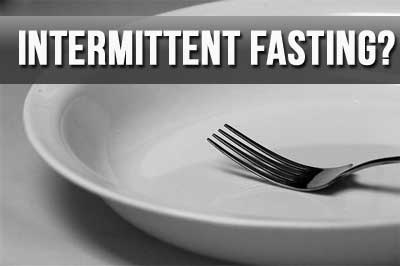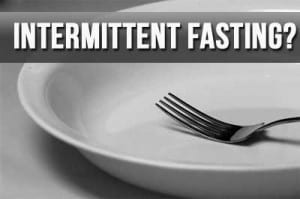 Burn Fat By Skipping Breakfast: How Intermittent Fasting can help you lose!
Burn Fat By Skipping Breakfast: How Intermittent Fasting can help you lose!
I hope everyone is continuing with their New Year Resolutions! – I say this because about this time is when everyone starts to fall off the wagon. If you're already off to a good start on a healthy fitness plan or healthy eating, and you're looking for ways to take it to the next level, then you might want to consider a form of fasting called Scheduled Eating, or intermittent fasting.
In essence this fitness-enhancing strategy looks at the timing of meals, as well as when NOT to eat. This isn't one of those fad plans, where you eat just one or two things for several days in a row.
In fact, the longest time I’d ever expect you to abstain from food is 14-18 hours (basically getting in the habit of skipping breakfast).
I realize that many of us (especially myself) have long heard that breakfast is the most important meal of the day. Believe me, telling someone to skip breakfast is a major shift from my typical recommendations of healthy eating.
But as many of you know- I am always learning and willing to change my own opinions on nutrition should sound science support it.
That said, following the implementation of our weight loss system, I’ve spent a great deal of time studying Obesity, weight loss and catching up on the volumes of literature that exist with respect to human metabolism. Based on the results that I’ve seen not only with my family members and patients, I’m confident to share a few suggestions!
First of all, I believe that fasting is not something you should undertake without any thought. You need to pay attention to your body, your energy levels, and how it makes you feel in general—especially if you're diabetic or hypoglycemic.
Intermittent Fasting for Weight Loss
One of the mechanisms that make fasting so effective for weight loss is the fact that it provokes the secretion of human growth hormone (HGH), which is a fat-burning hormone. It also plays an important role in muscle building. Fasting also increases catecholamines, which increases resting energy expenditure, while decreasing insulin levels, which allows stored fat to be burned for fuel. Together, these and other factors will turn you into an effective fat-burning machine.
Hence, if like millions of people, your goal is to shed excess fat, fasting can be both effective and beneficial for improving many disease markers.
Intermittent Fasting for Athletes
A 2008 study that evaluated the effect of fasting during the Muslim observance of Ramadan found it had a positive effect on body mass and other health markers in trained athletes. (http://www.ncbi.nlm.nih.gov/pubmed/19164831)
While athletes are certainly concerned with shedding excess fat, another overriding concern is the optimization of muscle growth. For this, you need protein. As a general guideline, you'll want to consume a high quality protein 30-60 minutes after finishing your workout. If you have not done so, ask for a free sample of our new protein meal replacement!
Here’s my new strategy: I typically delay my breakfast until 11 or 12 and workout around 10:15 AM. Since my last meal is typically around 8 PM, I will fast for about 13-17 hours before I eat my first meal. The fact that you are sleeping during most of this time makes it relatively painless and easy to do.
Avoid grain carbs! Although popular, “carb loading” is a mistake, particularly for people engaged in intense strength training, as you will burn carb fuel very quickly and then “hit the wall.” So careful when starting your day with muffins, bagels, or pancakes. This type of breakfast typically ignites a vicious cycle of hunger and snacking on even more carbs. And the more you continue eating these carb snacks, the more insulin resistant you become.
Remember: Grains spike Insulin levels. Insulin converts sugar to fat. More Insulin gives rise to more fat and if you always have insulin, you become insulin resistant (or Weight Loss Resistant).
According to Ori Hofmekler, author of The Warrior Diet, you can quite literally re-design your physique using a combination of under-eating and exercise. However this really only works well once your metabolism has become proficient at burning fat.
That’s what is so cool about our Dream Drops Weight Loss Program – it helps to turn the body from being a sugar burner, into a fat burner!
Intermittent Fasting for General Health and Longevity
Fasting is historically common-place as it has been a part of spiritual practice for millennia. But modern science has confirmed there are many good reasons for fasting, including:
- Normalizing your insulin sensitivity
- Normalizing ghrelin levels, also known as “the hunger hormone”
- Promoting human growth hormone (HGH) production, which plays an important part in health, fitness and slowing the aging process
- Lowering triglyceride levels
- Reducing inflammation and lessening free radical damage
Fasting causes hunger or stress. In response, the body releases more cholesterol, allowing it to utilize fat as a source of fuel, instead of glucose. This decreases the number of fat cells in the body… This is important because the fewer fat cells a body has, the less likely it will experience insulin resistance, or diabetes.
Even more remarkable, it’s been determined that fasting triggers a dramatic rise in HGH—1,300 %in women, and an astounding 2,000 % in men!
HGH, commonly referred to as “the fitness hormone” plays an important role in maintaining health, fitness and longevity, including promotion of muscle growth, and boosting fat loss by revving up your metabolism. The fact that it helps build muscle while simultaneously promoting fat loss explains why HGH helps you lose weight without sacrificing muscle mass, and why even athletes can benefit from the practice (as long as they don't overtrain and are careful about their nutrition).
The Bottom Line
I understand it can get confusing at times, trying to determine when and what to eat in order to optimize your health. Unfortunately, besides a few basic principles that will apply to virtually everyone, such as strictly limiting consumption of sugars (particularly fructose) and grains, the rest is really a matter of figuring out what works for your individual biochemistry. This requires some trial and error.
Personally, I skip breakfast and exercise in a fasting state whenever I've gained a few pounds and want to get them off. I find this works well for me. While I'm not eating breakfast, I don't really eliminate that meal entirely; rather I'm simply delaying it until noon or later, in order to reap the metabolic rewards of exercise combined with calorie restriction.
Also remember that fasting does not mean abstaining from ALL food for extended periods of time, but rather a dramatic reduction of calorie intake at regular intervals—whether you opt for a 16, 20, or 24 hour fast once or twice a week, or fasting every other day, or simply delaying certain meals, such as skipping breakfast and exercising on an empty stomach. As always, listen to your body, and go slow; work your way up to full day fasts if your normal schedule.


 Burn Fat By Skipping Breakfast: How Intermittent Fasting can help you lose!
Burn Fat By Skipping Breakfast: How Intermittent Fasting can help you lose!
